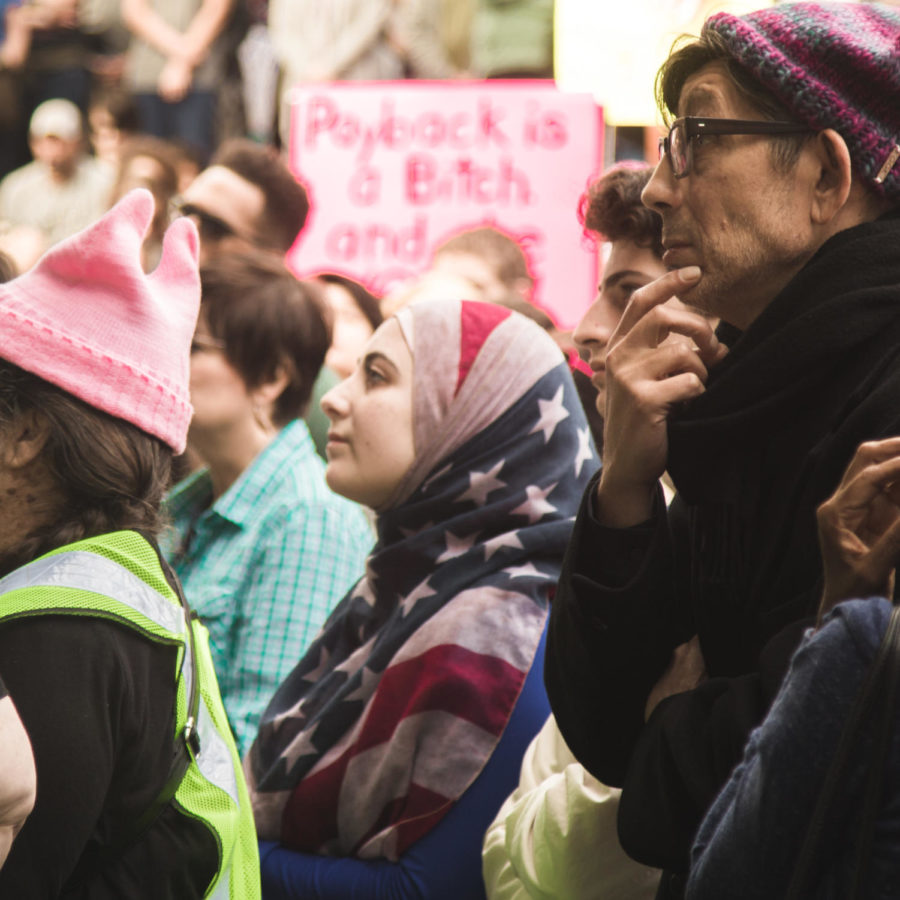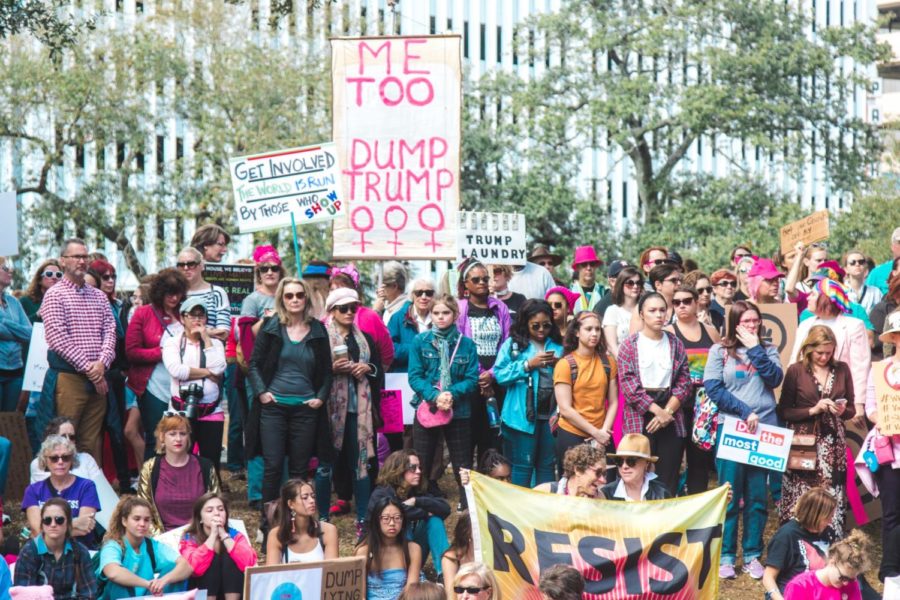Activists fight for equality at New Orleans Women’s March
A Muslim woman wearing an American flag hijab as she listens to the keynote speeches. Trump’s immigration travel ban was a major issue addressed by the Women’s March Photo credit: Matthew Dietrich
January 22, 2018
The one year anniversary of Trump’s inauguration was met with feminine resistance and activism in downtown New Orleans and across the country.
Five thousand women and allies congregated Saturday morning at Duncan Plaza and marched proudly through the French Quarter, rallying against sexual assault, healthcare reform, immigration policies and other human rights issues.
The New Orleans protesters joined sister Women’s March movements conducted in Denver, Raleigh, New York, Las Vegas and other major cities.
Activists took to the streets, many donning trademark pink cat ears hats, waving signs mocking Trump, gender inequality and other hot-button issues of the current administration.
The main objectives for this year’s march were bolstering voter registration and encouraging more women and Democrats to run in local elections. The organization Emerge Louisiana was present and reported 390 local women are being trained for public office.
In the past year, New Orleans elected its first woman mayor, Latoya Cantrell, who gave a keynote speech to the protesters.
“We all have a right to be respected. We all have a right to be loved. We all have a right to live in a city that represents and loves all people,” Cantrell said.
Cantrell noted that the city for the first time in its history is reflecting these goals, and New Orleans’ women can strive to make an impact come midterm elections.
“We have proven that women can advance, women can lead, and we can do it where we uplift women and equity in every move as we grow,” Cantrell said.
Loyola biology senior Victoria Odom said the dedication of the protesters was empowering.
“The oldest and youngest participants struck me the most. I couldn’t imagine having lived through the 50s to the 70s and still having to march down the street to demand equality. We owe a lot to the older generation of feminists,” Odom said.
Beyond pressing women’s issues like reproductive rights and sexual assault, this march was conscious to be inclusive, and many also marched for the plight of Muslims, transgender persons and African countries offended by Trump’s recent remarks.
Patricia Boyett, director of the Women’s Resource Center, said an open look at new issues is crucial to show the wide breadth of human rights united under feminism.
“I consider it vital that we address issues that affect all women and all genders in the feminist movement across the world. I support Mayor Elect Cantrell’s decision to reach out to El Salvador, Haiti and the entire African continent to let citizens of those nations know that she, like so many of us feminists in America, oppose President Trump’s racist comments,” Boyett said.
Peace volunteers were designated to keep crowds calm in the case that detractors might react adversely to the march. If there were such groups, they were unseen and unheard throughout the Central Business District and French Quarter.
Music industry senior Cristina de Arcos said she hopes movements like these inspire future generations of females.
“A big reason I marched was for my little sister, Gracie. I want to teach her that she can continue to be a strong, brave and independent girl as she enters her teenage years, when most girls tend to back down,” de Arcos said.
Patricia Boyett said that these human rights campaigns can progress only if maligned groups cooperate with one another.
“The feminist movement will never achieve gender equity unless feminists fight for the equal rights and dignity of all genders across the globe,” Boyett said.










Michael Martin • Feb 1, 2018 at 3:04 pm
WHERE IS MAROON’S COVERAGE OF THE HUNDERDS OF NEW ORLEANS YOUTH WHO PARTICIPATED IN THE NATIONAL OR LOCAL MARCH FOR LIFE???
Caleb Beck • Mar 24, 2018 at 8:36 pm
Hi Michael, sorry I’m just now getting back to you, I believe your all-caps query warrants a civil response. The Maroon is a student-run, volunteer-based newspaper with writers who hold all manner of political and religious convictions, hopefully no different than any other publication.
Our editorial board isn’t obliged to reflect the views of the Catholic university that houses us, as that might censure our freedom of reporting, no matter what we believe. Media ownership introduces a chilling effect on the diversity of opinion. That being said, no part of the editorial decision of publishing this article was meant to suggest a pro-life/pro-choice bias on the behalf of myself or the newspaper. In fact, that was only one small facet of the March, as well as the article above. Students attended this march, I engaged them, and I wrote this to carry the voices of the WOMEN and their allies, not specifically any PRO-CHOICE activism.
Michael Martin • Feb 1, 2018 at 3:03 pm
Assuming that Loyola New Orleans is still at least nominally a CATHOLIC university, there should be no coverage supporting a group which supports the slaughter of unborn children.
WHERE IS MAROON’S COVERAGE OF THE HUNDERDS OF NEW ORLEANS YOUTH WHO PARTICIPATED IN THE NATIONAL OR LOCAL MARCH FOR LIFE???